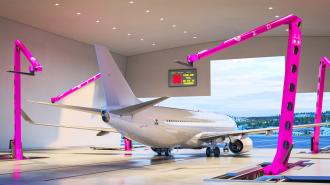A Norwegian startup is building massive AI robots to help airlines reduce their carbon emissions, save water, and inspect their planes in a fraction of the time it usually takes.
The challenge: The aviation industry is responsible for about 2.5% of global carbon emissions, and while sustainable jet fuels or electric propulsion systems could one day slash that figure, airlines can reduce their emissions right now — simply by cleaning their planes more often.
Washing an airplane’s exterior reduces air resistance, which means it can decrease the amount of jet fuel a plane needs to burn by up to 2% — while that’s not a huge difference, it can add up when you consider there are about 28,000 commercial jets in the global fleet.
A large airplane can take up to 24 hours to clean, though, so most airlines only wash them every 2 to 6 months, and when they do, they typically don’t bother to collect the water and chemicals used for the process. Instead, it’s allowed to run off into the soil, which is both wasteful and potentially damaging to the environment.
“The solution from Avinxt is one of several initiatives that can help us reduce our carbon footprint.”
Thom-Arne Norheim
What’s new? Norse Atlantic Airways, a low-cost airline based in Norway, has announced plans to begin using massive AI robots (developed by another Norwegian company, Avinxt) to quickly and sustainably wash, de-ice, and inspect its airplanes.
“The solution from Avinxt is one of several initiatives that can help us reduce our carbon footprint while at the same time reducing our costs,” said COO Thom-Arne Norheim. “That is a win-win.”
The AI robots: According to Avinxt, the robot’s combination of cameras and AI software allows it to clean a plane’s entire body and engine in about 75 minutes. An inspection, meanwhile, takes just 7 hours, compared to days or even weeks if done manually.
As an extra step toward sustainability, Avinxt’s system captures and recycles almost all of the water and chemicals used during cleaning and de-icing, preventing them from reaching the environment while simultaneously cutting costs for airlines.
“There is no reason why airports, airlines, the air force, and ground handlers should continue with manual, time-consuming, and expensive processes.”
Ove Trøen
Looking ahead: Avinxt has signed letters of intent with two other airlines — Widerøe and Norwegian — in addition to forming the new partnership with Norse.
The company now plans to begin building the first full-sized versions of its AI robots at Oslo Airport in 2024, followed by bots at London Gatwick, Norse Atlantic Airways’ hub. Once completed, they’ll be the world’s largest robots, according to Avinxt.
“There is no reason why airports, airlines, the air force, and ground handlers should continue with manual, time-consuming, and expensive processes when we can do it faster, better, more environmentally friendly, and more cost-effective by using new technology,” said Ove Trøen, CEO and chairman of Avinxt.
We’d love to hear from you! If you have a comment about this article or if you have a tip for a future Freethink story, please email us at [email protected].






